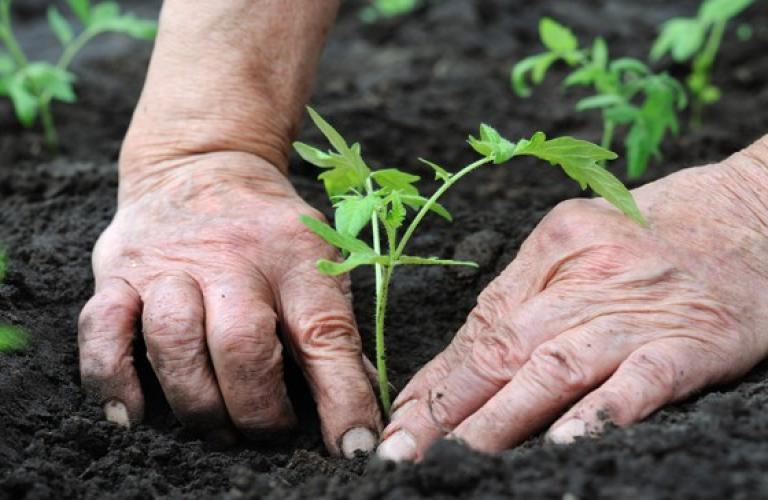Organic Farming Brings A Breath of Fresh Air in Kashmir

Dhaka, 6 August, 2020: When Insha Rasool came back to Kashmir after working as a research scholar in South Korea, she was inclined to work independently and start something of her own. A pass-out of Indian Institute of Sciences, Bengaluru, Insha started Home Greens, an organic farm, on her family land.
“I come from human science research background so I have an idea about the effect of chemical pesticides and fertilizers on human health,” says Insha.
Many studies have shown that fertilizers and pesticides used in conventional farming end up in the body, besides the polishing material used to extend the shelf life of vegetables create mutation with some sort of manifestation, she informs.
After starting organic farming in 2019, Insha opted for exotic vegetables, than going with conventional ones.
“It’s been a good learning curve but obviously, there are setbacks,” says the researcher.
“There’re people around me who still promote conventional methods of farming which imposes many hurdles in my way.”
Organic farming is research-driven and Insha had to gather a lot of information from the literature available. She has to study the impact of a particular kind of organic fertilizer that is eco-friendly before using it.
Since nothing is readily available in Kashmir, she has to bring a lot of material from outside. She then performs a set of trials and chooses the product which gives the best result.
“It is time-consuming but the product is worth all the efforts,” says the self-starter.
One of the major challenges faced by Insha in Kashmir is the unavailability of authentic seeds. To tackle this problem, she has started a seed bank for exotic and conventional farm products. The self-taught farmer plans to go fully commercial once everything stabilizes.
Like Insha, many people in Kashmir are moving towards organic farming.
Organic farming is eco-friendly, sustainable, and helps in maintaining a pollution-free environment. The present exhaustive agricultural practices in the valley favour it. The soil has lost the microbial culture that will create an amicable situation in the soil for optimum availability and utilization of nutrients in the soil.

Already, Kashmir with its distinctive topography, exceptional ecological and climatic conditions provide unique aroma and taste to its crops.
Even after the Green Revolution introduced high-yielding crops in the world, the valley has been in compulsive, unorganized organic farming for a pretty long time, says Dr. VK Sahani, a Ludhiana-based agricultural scientist, who gives training to Kashmiri farmers on the use of organic fertilizers and pesticides through Agricare Organic Farm, an agricultural consultancy group.
Dr. Sahani claims that Kashmir has huge potential for organic farming, as large areas in the hilly districts of the valley are already under semi-organic cultivation due to the unavailability of chemical agro-inputs in these areas.
To encourage more farmers to opt for organic farming, the consultant is planning to give buyback options to them. He plans to buy organic produce from the farmers and sell it through Agricare Organic Farm.
Many organizations are also coming up in Kashmir to promote organic farming.
Showkat Hussain, program officer at the Indo Global Social Service Society (IGSSS), has been working since 2017 to promote organic farming in the Bandipora and Baramulla districts of Kashmir.

To make farmers understand the importance of organic farming, IGSSS took them back to their roots of permaculture and made them understand its importance.
Permaculture is an ecological design system for sustainability in all aspects of life. It teaches how to build natural homes, grow food, restore landscapes and ecosystems, catch rainwater, build communities, take care of waste, and much more.
At first, Hussain taught the farmers how to practice organic farming in their backyards.
They were encouraged to build a low-cost vermicomposting unit near the farms and create a buffer zone in the field to practice organic farming using vermicompost and manure, says the program officer.
IGSSS also opened two farmer field schools for vegetable and rice cultivation in two Bandipora villages and trained 25 facilitators who currently look after their respective areas and tackle the issues faced by farmers, he informs.
Explaining pure organic farming, Hussain says that using organic fertilizers or pesticides for one year cannot be called organic farming rather it can be termed as chemical-less farming. “It takes three-four years to have a pure organic farm,” he says.
On being asked about the official support, Hussain says that initially there was no help, but recently the government has shown some interest.
“If the authorities talk to growers, the organic farming will become more effective,” says the program officer.

In 2017, Tahir Maqsood Wani started organic farming in the valley along with his agricultural scientist friend. The response was good, he says, but due to some unprecedented circumstances he had to shift his work to Punjab.
The concept of organic farming, Wani says, is not picking up on a large scale in Kashmir due to official apathy.
But Dr. Syed Waseem, Information Officer, Department of Agriculture, Kashmir, does not agree with the assertion.
He claims that the department is regularly imparting training and awareness to the farmers regarding it.
“Recently we concluded Kisaan Pakwada, where different types of fairs and awareness campaigns were organized for the farmers,” informs Waseem.
The agriculture department, he says, runs many schemes to encourage organic farming.
Today’s farmer, Waseem believes, is not the same as seen 20 years ago. “These days everyone is health conscious and farmers are fetching more price for organically grown crops,” the information officer says.
To tackle the ‘growing’ organic farming enquiries, the government has set up telephone lines to assist farmers in Kashmir.
Waseem gets to attend approximately 30 calls every day from different parts of the valley.
“The growing interest is the sign that Kashmir is getting health conscious now,” the information officer believes. “And that’s what makes the entire concept of organic farming as a breath of fresh air in Kashmir.”

